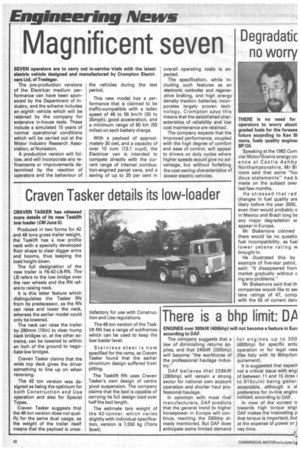Magnificent seven
Page 14

If you've noticed an error in this article please click here to report it so we can fix it.
SEVEN operators are to carry out in-service trials with the latest electric vehicle designed and manufactured by Crompton Electricars Ltd, of Tredegar.
The pre-production versions of the Electricar medium performance van have been sponsored by the Department of Industry, and the scheme includes an eighth vehicle which will be retained by the company for extensive in-house tests. These include a simulated 15 years of normal operational conditions which will be carried out at the Motor Industry Research Association, at Nuneaton.
A production version will follow, and will incorporate any refinements or improvements determined by the reaction of operators and the behaviour of the vehicles during the test period.
This new model has a performance that is claimed to be traffic-compatible with a laden speed of 48 to 56 km/h (30 to 35mph), good acceleration, and a minimum range of 80 km (50 miles) on each battery charge.
With a payload of approximately 30 cwt, and a capacity of over 10 cum (13.1 cuyd), the Electricar van is intended to compete directly with the current range of internal combustion-engined parcel vans, and a saving of up to 20 per cent in overall operating costs is expected.
The specification, while including such features as an electronic controller and regenerative braking, and high energy density traction batteries, incorporates largely proven technology. Crompton says this means that the established characteristics of reliability and low cost maintenance are retained.
The company expects that the improved performance, coupled with the high degree of comfort and ease of control, will appeal to drivers on duty cycles where higher speeds would give no advantage, but without forfeiting the cost-saving characteristics of slower electric vehicles.






















































